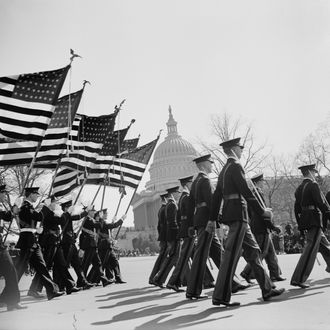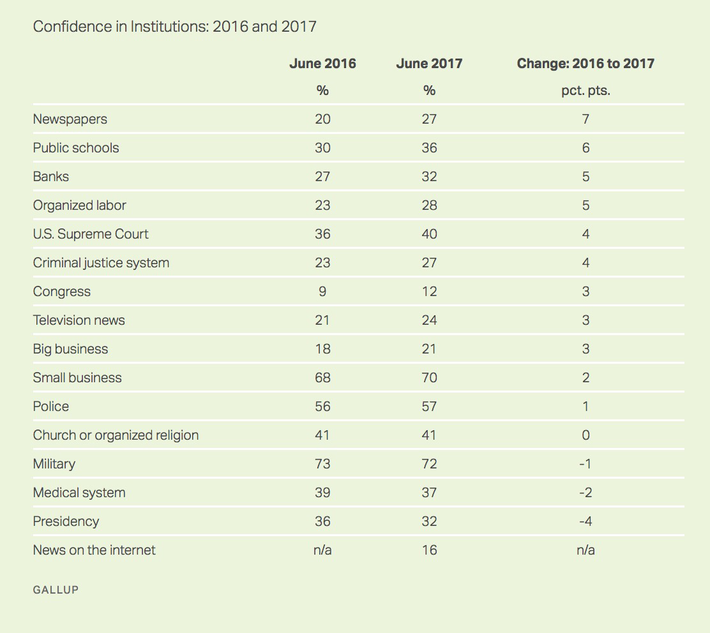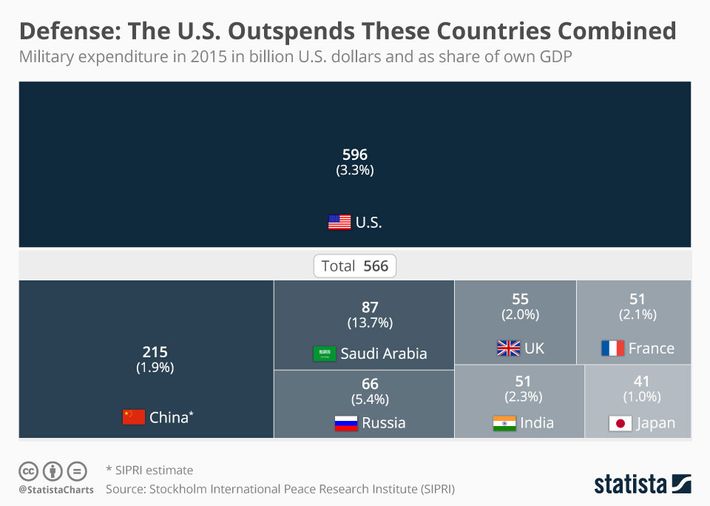
Donald Trump wants to march soldiers and tanks through the streets of our capital in “celebration of the men and women who give us freedom” — and/or himself.
This is a perfectly Trumpian proposal: a superficial display of strength that reeks of insecurity; an imitation of grandeur that evinces only garish stupidity; a gesture that simultaneously conveys the comic fantasies of a toddler president — and the terrifying prospect of an authoritarian one.
It is also a thoroughly American idea.
That last claim is probably more controversial than the ones that preceded it. On Thursday morning, MSNBC’s Joe Scarborough declared the president’s requested military parade “deeply un-American” and “a little bit frightening.” His co-host, Mika Brzezinski, suggested that such a spectacle belongs exclusively in places like North Korea. Democratic congressman Adam Smith said that such a stunt would “be a departure from the values of our constitutional democracy,” while Republican senator John Kennedy dismissed the proposal with an aphorism, “Confidence is silent and insecurity is loud.” And Sherrilyn Ifill, president of the NAACP’s Legal Defense and Educational Fund, asked on Twitter, “Why is the focus on the financial cost of a military parade — as though the idea of this kind of display does not represent a huge and dangerous cultural shift, and an identity-changing moment for this country?”
These sentiments all strike me as normatively correct, but descriptively wrong. There is certainly a deep-seated strain of anti-jingoism in American culture. And personally, my ideal conception of Americanness is one characterized by that tradition of skepticism toward authority, and aversion to imperialism (and all the pomp and circumstance that goes with it).
But that is not the dominant tradition in American society today. And it is hard to see how Trump’s military parade could inaugurate any “dangerous cultural shift” that wasn’t already set in motion by 9/11 (if not by Hiroshima, or Pearl Harbor, or the sinking of the Lusitania).
We already live in a country where a majority of citizens lack confidence in all government institutions — except for the military and, to a lesser extent, the police. We are already a nation where 15 million children live in poverty, 30 million people have no health insurance, basic infrastructure lies in disrepair — and the military enjoys a budget larger than those of the next seven greatest martial powers combined. We are already prosecuting a global war over which Congress exercises approximately no oversight — and which is widely accepted as indefinite (if not infinite) in duration.


Granted, many critics of Trump’s desired spectacle do not oppose it out of an objection to military worship, but merely to the authoritarian overtones of such a performance. In this view, the problem isn’t the American public’s veneration of the armed services above all other institutions, or the gross misallocation of resources and preemptive wars that this abets — or even the concept of a military parade, per se. Rather, the issue is that this parade would not be a celebration of the “achievements by the American people,” like the parades that followed the Gulf War and World War II, but rather an act of tribute to the president himself.
But even if one embraces a jingoistic conception of American identity — and solely objects to an authoritarian one — Trump’s parade would not undermine your national ideal any more than the realities of the modern U.S. state do already. We are already a country that provides its police departments with combat vehicles, M16 assault rifles, and grenade launchers; and where the subjective fear of an individual police officer is regarded as legal grounds for the summary execution of criminal suspects.
And while the sight of soldiers goose-stepping down Pennsylvania Avenue might imbue our commander-in-chief with an autocratic aura, our laws already provide him with autocratic powers. President Trump already has the authority to indefinitely detain American citizens, without charge or trial, so long as he declares them to be suspected terrorists first.
We have also, of course, given him the unilateral authority to end (virtually) all human life.
All of which is to say: Trump’s parade might be a more conspicuous affront to our republican ideals than the mundane realities of the military-industrial complex, the imperial presidency, and global war on terror — but it would also be a much more trivial one.
There is an America where random military parades have no place; a nation founded on the principle of self-rule, where the aversion to arbitrary authority — and the equation of might with right (at least, when applied to conflicts between white male citizens of property) — was once so strong, the very concept of a standing army was thought tantamount to treason.
But we do not live in that America today. And if we wish to tomorrow, we’re going to need to mobilize in opposition to much more than the president’s parade permit.






























